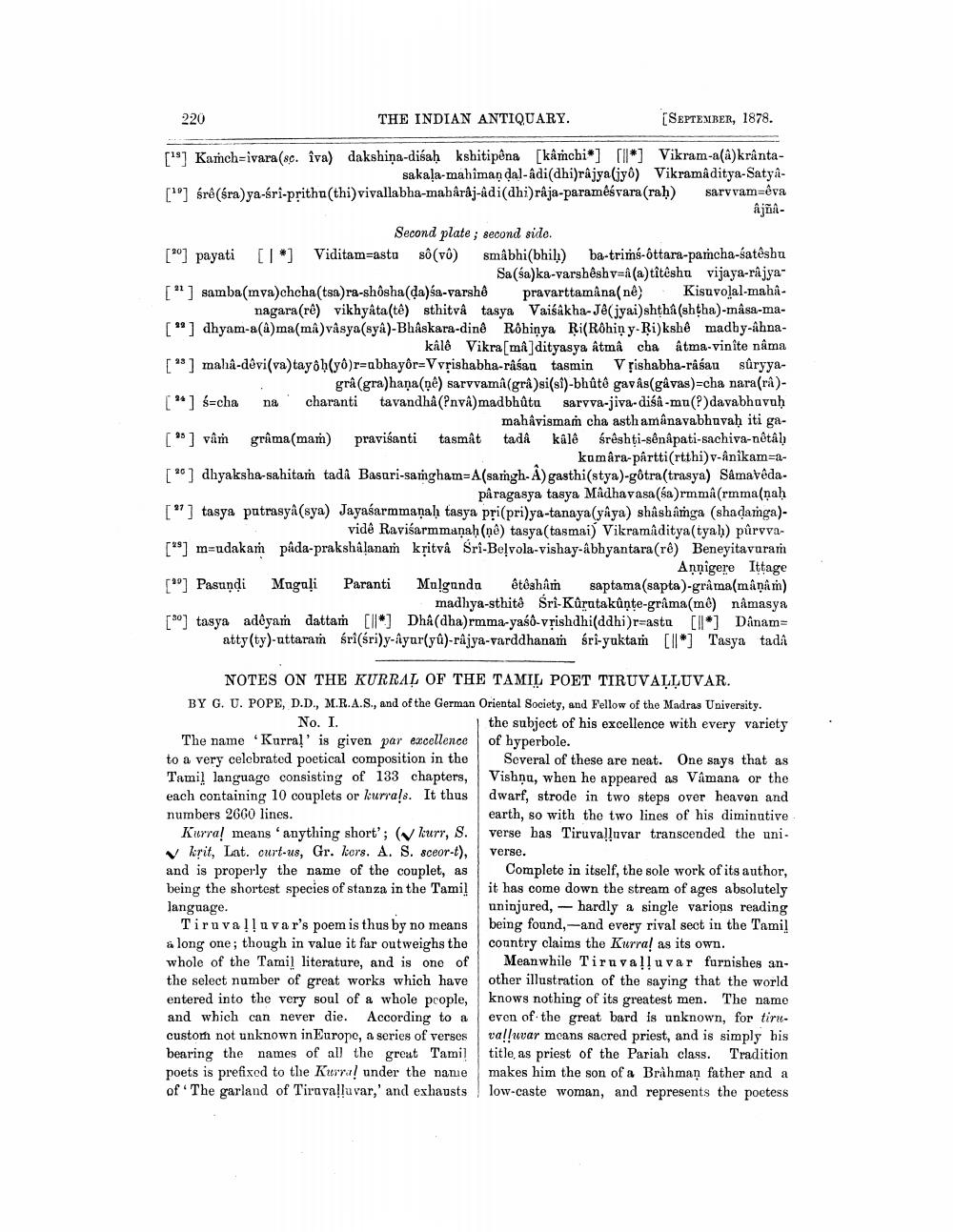________________
220
THE INDIAN ANTIQUARY.
SEPTEMBER, 1878.
[1] Kamch=ivara(sc. iva) dakshiņa-diśaḥ kshitipêna [kamchi*] [*] Vikram-a(a)kranta
sakala-mahiman dal-adi(dhi)rajya (yo) Vikramaditya-Satya[""] śré(śra)ya-sri-prithu(thi)vivallabha-maharaj-adi(dhi)râja-paraméśvara (rah) sarvvam=êva
ajñaSecond plate ; second side. [9] payati [] Viditam=astu số (vỏ) smabhi(bhil) ba-tring-ôttara-parncha-satasha
Sa(sa)ka-varsheshv=f(a)titishu vijaya-rajya" [^] samba(mva)chcha(tsa)ra-shosha (da)sa-varshê pravarttamâna(ne) Kisuvolal-maha
nagara(re) vikhyata(te) sthitva tasya Vaisakha-J&(iyai)shthi (shtha)-masa-ma["] dhyam-a(k)ma(ma) vâsya(sya)- Bhaskara-dinê Röhinya Ri(Rôhiņ y-Ri)kshể madhy-ähna
kalê Vikramadityasya atma cha atma-vinite nama [*] maha-devi(va)tay (y)r=abhayôr=Vvrishabha-råśau tasmin Vpishabha-rašau suryya
grå(gra)hana(ne) sarvvami (grâ)si(sl)-bhûtê gavâs(gavas)-cha nara(ra)["] ś=cha na charanti tavandhå (?nvâ) madbhûtu sarvva-jiva-disk-mu(?) davabhuvuḥ
mahậvismam cha asth amânavabhuvah iti ga[ "S] vam gråma(mam) pravišanti tasmåt tadâ kâlê śrêshti-sênâpati-sachiva-nêtâh
komâra-pártti(rtthi) v-anikama[°C] dhyaksha-sahitam tadà Basari-samgham-A(samgh-Â)gasthi(stya)-gôtra(trasya) Sámavêda
på ragasya tasya Madhavasa (sa)rmmarmma(nah [] tasya putrasyâ(sya) Jayaśarmmarah tasya pri(pri)ya-tanaya(yâya) shashanga (shadamga)
vide Ravisarm manah (nê) tasya tasmai) Vikramaditya (tyab) pûrvva[*] m=udakam pâda-prakshålanam kritvå Sri-Beļvola-vishay-abhyantara(rê) Beneyitavaram
Annigere Ittage [""] Pasundi Muga?i Paranti Mulganda êtêsham saptama(sapta)-grama(mânâm)
madhya-sthitô Sri-Kurutakûnte-grama(m) nAmasya [*] tasya adêya dattaṁ [ll*] Dhâ(dha)rmma-yaśô vộishdhi(ddhi)r=astu [Il*] Dânam=
atty (ty)-uttaram sri(sri)y-îyar(yû)-rajya-varddhanam śri-yuktam [ll*] Tasya tada
NOTES ON THE KURRAL OF THE TAMIL POET TIRUVALLUVAR. BY G. U. POPE, D.D., M.R.A.S., and of the German Oriental Society, and Fellow of the Madras University. No. I.
the subject of his excellence with every variety The name Kurra!' is given par excellence of hyperbole. to a very celebrated poetical composition in the Several of these are neat. One says that as Tamil language consisting of 133 chapters, Vishnu, when he appeared as Vamana or the each containing 10 couplets or kurrals. It thus dwarf, strode in two steps over heaven and numbers 2660 lines.
earth, so with the two lines of his diminutive Kurra! means anything short'; (v kurr, S. verse has Tiruvalluvar transcended the uni. v krit, Lat. curt-us, Gr. kors. A. S. sceor-t), verse. and is properly the name of the couplet, as Complete in itself, the sole work of its author, being the shortest species of stanza in the Tamil it has come down the stream of ages absolutely language.
uninjured, hardly a single various reading Tiruvalluvar's poem is thus by no means being found, and every rival sect in the Tamil a long one; though in value it far outweighs the conntry claims the Kurra! as its own. whole of the Tamil literature, and is one of Meanwhile Tiruvalluvar furnishes anthe select number of great works which have other illustration of the saying that the world entered into the very soul of a whole people, knows nothing of its greatest men. The name and which can never die. According to a even of the great bard is unknown, for tirucustom not unknown in Europe, a series of verses va!!war moans sacred priest, and is simply his bearing the names of all the great Tamil title as priest of the Pariah class. Tradition poets is prefixed to the Kurra! under the nanie makes him the son of a Brahman father and a of The garland of Tiravalluvar,' and exhausts low-caste woman, and represents the poetess




